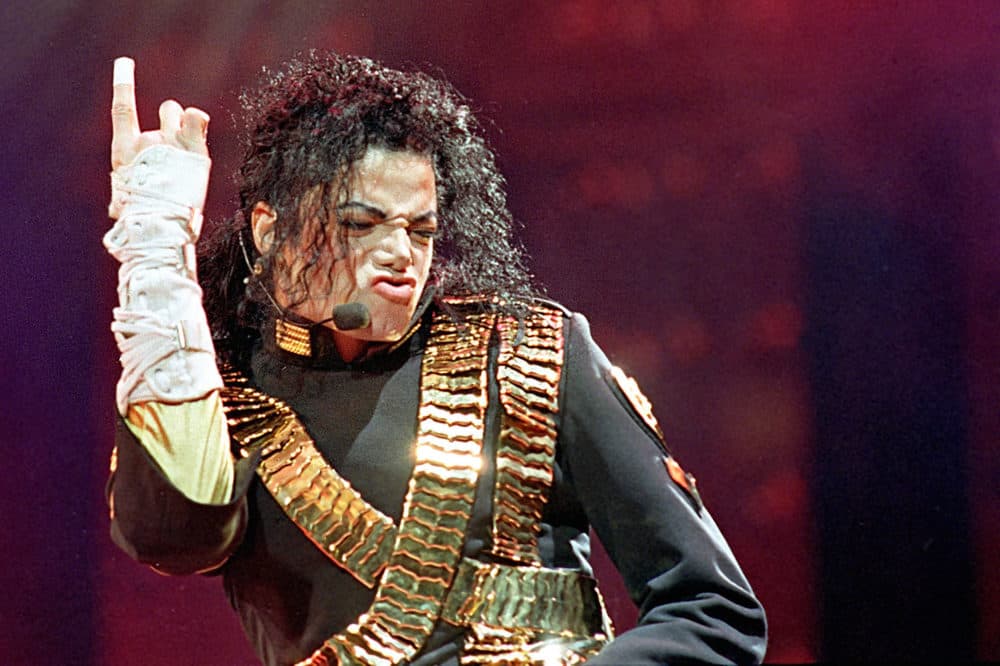Advertisement
Commentary
For Once And For All, Stop Asking Us To Separate Art From The Artists

Want another take? Here's Ed Siegel's argument to censure the artist, but never the art.
Up until a couple of weeks ago, I still listened to Michael Jackson's music. I should qualify that: I didn't just listen. I joyously consumed his music like a happy family ritual, one that I imparted upon my 4-year-old son.
My husband, who like me grew up dancing to "Off The Wall" and "Thriller," would blast the records on Saturday mornings while our son did his best at the moonwalk. Every Halloween, our family tradition entailed a Thriller dance before venturing out to trick-or-treat. I have many Instagram story highlights of my son feverishly dancing to "Bad" and "Remember the Time," mimicking Jackson's moves while watching his music videos to cheers and claps and giggles from his giddy parents off-screen. There's one particular video — that when I look at now, stings my heart — of my son yelling enthusiastically "It's Michael Jaaaaaaaacksssssoonnn!" when he sees him on TV.
Now in our early and mid-30s, my husband and I are products of '80s and '90s pop culture. Children of immigrants, we never felt more American than when we danced to Michael Jackson. Being his fan was a marker of our assimilation. And an authentic one, too. We didn't like Michael Jackson because we wanted to be American. We just happened to be like any other American kid in this respect. What a unifying symbol.
Children of immigrants, we never felt more American than when we danced to Michael Jackson. Being his fan was a marker of our assimilation.
I was seven years old when the 1993 allegations of sexual abuse against Jackson first surfaced, and then 19 in 2005 when he was tried and acquitted. I wasn't listening much to Jackson then. And somewhere along the way, I did what I suspect so many Americans did. I forgot about what Jackson had been accused of. I recognize the privilege in being able to do so.
Then I became a parent. My husband and I remembered what delight Jackson's music had brought to our life. How we'd each dance to his music in our bedroom for hours, how awed we were by his elaborate videos as a kid. My husband, a music critic, wanted to impart the experience to our kiddo. So we'd dance and laugh and sing to Jackson — recreating our gleeful childhood memories.
We'll never do those things again. After watching "Leaving Neverland," I, like so many of you, can't stomach Jackson's videos. Now, I feel such shame for so explicitly introducing my child to Jackson. If I heeded the words of my predecessor, former ARTery editor Ed Siegel, that I should always separate the art from the artists, then I guess I could continue our Jackson dance-offs. By Siegel's argument, the "truths" in Jackson's music — the sheer artistry of it, the mastery of melody, the cultural value it brings to the world — outweigh its creator's dark legacy and should be untethered from it.
Look, I make a living extracting meaning from art. Of course I think there are "truths" in cultural work. But to argue, as Siegel does, that those "truths" are as important as the truths in science or medicine is simply a false equivalency. Penicillin literally saves lives. Art does not literally save lives.
Sure, artistic expression is the manifestation of our shared humanity. It's what separates us from animals — what makes us distinctly human and whole. It's where we find deeper truths about the human experience, about our individual and collective selves.
Advertisement
It's also a major industry. One that adds $764 billion to the U.S. economy.
Art is commerce — one that has helped privileged white men and diminished almost everyone else — a basic, fundamental truth that Siegel fails to acknowledge.
The art that we uphold as genius or indispensable from human history is also of this world — tethered to and a product of existing systems of power, like capitalism and white supremacy. I feel silly typing such an obvious observation. But alas, somehow it's overlooked again and again, like seeing one dot on a pointillism mural and asserting you have the whole picture.
Our perception of art is shaped by who society celebrates and who it silences. This is particularly evident in fine art, where 85 percent of artists in U.S. museum collections are white, and 87 percent are male.
Art does not exist in its own altruistic, alternate universe. It's part of the world — and the patriarchy. Sales of his music directly benefit R. Kelly. Watching his movies directly benefits Woody Allen.
Art does not exist in its own altruistic, alternate universe. It's part of the world -- and the patriarchy.
Movies, music and every artistic medium tied to a market has systemically oppressed women. From Donald Judd arguably hijacking minimalism from artists like Anne Truitt, to Harvey Weinstein allegedly tormenting actresses and sidelining their careers, the artistic world is filled with brutality and despotism.
And it's an oppression that's made possible — even encouraged — by titanic industries. Art is money.
I don't mean to sound like the moral police here. This is a messy road. We each make choices on what our limit of consumption is. I used to think that if the problematic artist was dead, then perhaps there was no harm in partaking in their art.
But Jackson has forced me to rethink that. Not for the sake of the artist's estate. I know excising his music from my life won't hurt his family's financial interests, especially given how little his music has suffered since the documentary. But for my son's sake. What message am I sending to him if we continue to bask in fandom for a man accused of brutalizing the most vulnerable?
I will always love Jackson's music. I won't pretend I don't feel a loss. And perhaps one day, I'll figure out a way to reconcile, instead of simply expunging it from my life. But how can I encourage its consumption when I know that it's that very love that blinded us to the alleged abuse that has scarred minds and bodies and ruined lives? Lives like my son's. Innocent, vulnerable, joyful.
Siegel can talk about artistic truths. I choose to honor the truths that have been silenced — of victims, of women, of people of color, of those abused and then tossed by the industry of art.
